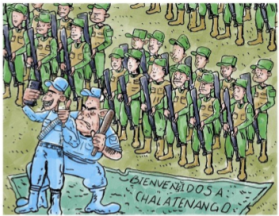2015 Campaign Season Begins
As the March 1st elections of mayors and representatives to the National Legislative Assembly and Central American Parliament (PARLACEN) approach in El Salvador, campaign season is in full swing, with billboards, telephone poles and television screens full of publicity for legislative and mayoral candidates alike. With 43 seats needed for a simple majority in the Legislative Assembly, both the governing Farabundo Martí National Liberation Front (FMLN) party and the right-wing Nationalist Republican Alliance (ARENA) party are vying to increase their seats, the FMLN in order to advance the executive government’s progressive agenda, and ARENA to undermine it. So far, it appears that the FMLN is taking the lead.
ARENA currently holds 28 out of 84 legislative seats. The right-wing party's legislative platform for the 2015-2018 term focuses more on general commitments than specific legislative proposals, and includes credit for small businesses, a Fiscal Health bill, and making English El Salvador’s second language. As recent Supreme Court decisions have increasingly reoriented El Salvador’s electoral system from a party-centered system to an individual-centered one, ARENA has undertaken an individualized campaigning strategy, its candidates and their benefactors independently wealthy enough to splurge on massive advertising campaigns encouraging voters to mark their individual images on the ballot. This strategy, which seeks to associate voters with candidate’s faces rather than ARENA’s flag, speaks to the party’s fall from grace in public opinion following recent electoral defeats, internal divisions and an ongoing parade of corruption scandals.
The FMLN currently holds 33 seats in the Assembly. The leftist party’s 2015-2018 proposals include the passage of the Arts and Culture Law, the creation of a Pedagogical Studies Institute to train future teachers, the creation of specialized courts for gender-based violence, constitutional guarantees to the right to food and water, and the prohibition of metallic mining. In spite of the recent changes to shift the electoral system’s focus to individual candidates over the collective projects of political parties, the FMLN is campaigning as a unified party under the slogan “We work in your favor,” and urging its base not to vote for particular candidates, but to simply vote for the party flag. The strategy appears to be working: a November poll conducted by the conservative newspaper La Prensa Gráfica showed that 34.7% of participants would prefer the FMLN to maintain control of the Legislative Assembly, with 19.7% preferring that ARENA gain more power in the Assembly and 26.9% preferring a “balance.”
In the municipal races, polls show the FMLN poised to regain not only the capital city of San Salvador, but many of the populous municipalities making up its urban sprawl that were historically governed by the FMLN and went to ARENA in 2012. The Prensa Gráfica poll found that in the greater San Salvador metropolitan area, 38.3% of participants intended to vote for the FMLN, while 30.7% intended to vote for ARENA. In San Salvador, a December poll by CS Sondea found that 50.8% of participants intended to vote for the FMLN mayoral candidate Nayib Bukele, with 34.4% intending to vote for ARENA’s Edwin Zamora. 42.7% of San Salvador residents also intended to vote for FMLN legislators, while 36.5% would vote for ARENA representatives. Another December poll by Vox Latina also gave the FMLN a strong lead in the San Salvador suburb of Santa Tecla, formerly governed by now Vice President Oscar Ortiz of the FMLN: 54.3% expressed a preference for the leftist candidate, while 33.9% preferred the ARENA candidate.
The March 1st vote will pose a critical test for the direction of El Salvador’s policy project, whether it will continue on path revolutionary path forged by the Left or revert towards its conservative, neoliberal past. Thus far, signs favor the former.


 "I am a CISPES supporter because continuing to fight for social justice and a more people-centered country means continuing the dream and sacrifice of thousands of my fellow Salvadorans who died for that vision.” - Padre Carlos, New York City
"I am a CISPES supporter because continuing to fight for social justice and a more people-centered country means continuing the dream and sacrifice of thousands of my fellow Salvadorans who died for that vision.” - Padre Carlos, New York City

